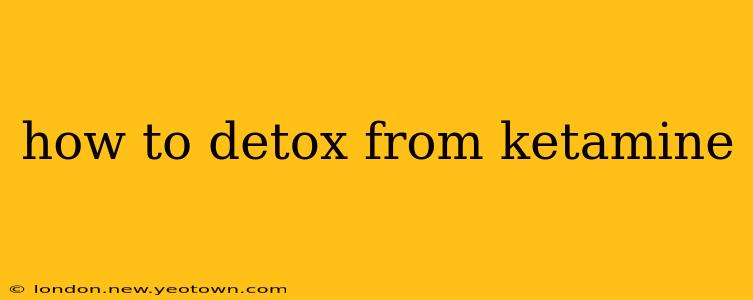How to Detox from Ketamine: A Journey to Recovery
Ketamine, a powerful anesthetic with increasing recreational use, can lead to dependence and a difficult detoxification process. This isn't a journey you should undertake alone. It requires professional guidance and support to navigate the physical and psychological challenges safely and effectively. This article explores the process, offering crucial insights and answering common questions. Remember, seeking help from qualified medical professionals is paramount. This information is for educational purposes and should not be considered medical advice.
What are the Dangers of Ketamine Withdrawal?
Ketamine withdrawal symptoms vary depending on factors like the frequency and duration of use, the dosage, and individual factors. However, they can be severe and even life-threatening. Imagine a rollercoaster of intense physical and mental symptoms. This isn't a simple case of feeling tired; it's a complex interplay of physiological responses.
Some common symptoms include:
- Intense cravings: An overwhelming urge to use ketamine again, often the most challenging aspect of detox.
- Depression and anxiety: A profound sense of sadness, hopelessness, and overwhelming worry, sometimes leading to suicidal thoughts.
- Insomnia and vivid dreams: Difficulty sleeping, coupled with disturbing nightmares and sleep disturbances.
- Gastrointestinal issues: Nausea, vomiting, diarrhea, and stomach cramps.
- Increased blood pressure and heart rate: A racing heart and elevated blood pressure, potentially dangerous for those with pre-existing conditions.
- Hallucinations and delusions: Distorted perceptions of reality, including seeing or hearing things that aren't there.
- Muscle aches and pains: General body pain and stiffness.
- Seizures: In severe cases, potentially life-threatening convulsions.
Ignoring these symptoms can have serious consequences, including relapse, mental health deterioration, and even death. This underscores the critical need for professional medical supervision.
What is the Ketamine Detox Process Like?
Detoxing from ketamine is not a one-size-fits-all process. The approach depends heavily on the individual's history of ketamine use, overall health, and any co-occurring mental health disorders. Think of it as a personalized roadmap to recovery, guided by medical experts.
The process often involves:
- Medical evaluation: A comprehensive assessment to determine the severity of dependence and any potential health risks.
- Stabilization: Addressing immediate withdrawal symptoms through medication, hydration, and nutritional support. This is crucial to minimize discomfort and prevent complications.
- Symptom management: Medications may be used to alleviate specific symptoms like anxiety, depression, insomnia, and pain.
- Therapy: Individual and group therapy sessions provide vital support in addressing the underlying causes of ketamine use and developing coping mechanisms.
- Aftercare planning: Developing a long-term plan for continued support, including ongoing therapy, support groups, and relapse prevention strategies.
How Long Does Ketamine Detox Take?
The duration of ketamine detox varies, typically ranging from several days to several weeks, depending on the individual's circumstances. There's no magic number; it's a personalized timeline guided by the professionals involved.
What are the Treatment Options for Ketamine Addiction?
The road to recovery from ketamine addiction often involves a multi-faceted approach, combining medical and psychological interventions. The treatment plan is tailored to the individual's needs.
This can include:
- Medication-assisted treatment (MAT): Using medications to help manage withdrawal symptoms and reduce cravings.
- Behavioral therapies: Cognitive Behavioral Therapy (CBT) and other therapies to address underlying issues that contribute to substance abuse.
- Support groups: Connecting with others facing similar challenges provides a sense of community and shared experience.
Where Can I Find Help for Ketamine Addiction?
Finding the right help is a crucial first step. Resources include:
- Rehabilitation centers: Specialized facilities offer comprehensive detox and rehabilitation programs.
- Psychiatrists and addiction specialists: Medical professionals provide assessments, treatment plans, and medication management.
- Support groups: Organizations like Narcotics Anonymous (NA) offer peer support and guidance.
The journey to recovery from ketamine addiction is challenging, but it is possible. With professional guidance, support, and a commitment to change, individuals can overcome dependence and lead fulfilling lives. Don't hesitate to seek help; your health and well-being are worth it.

